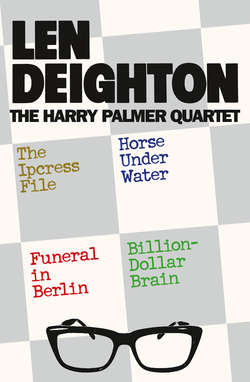Читать книгу The Harry Palmer Quartet - Len Deighton - Страница 20
9
ОглавлениеDalby had buzzed me for a meeting at three o’clock. It was in the board-room downstairs. The large red-brown shiny oval table reflected the grey windows with the rain dribbling downward. The electric light shone from a gaunt chandelier-type thing of thin poor-quality glass. Dalby stood with his Bedford-cord behind in front of a puny, one-bar electric fire that looked and felt diminutive in the large Victorian fire-place in which the brass shovel and poker were kept polished. Above his head a vast portrait of a man in frock-coat and beard had almost entirely relapsed into the brown gloom of the coach varnish. Uncomfortable upright chairs unused by dint of their discomfort stood at attention like family retainers along the dead-flower-print wallpaper. High up on the wall above the picture rail a large clock tick-tocked away the sparse daylight hours. A minute or so before three, Painter, the doctor, came in. Dalby continued screening his face with the Guardian, so we nodded to each other. Chico was sitting down already. I had no particular reason to speak to Chico. He was in one of those moods where he kept saying things like, ‘What about old Davenport then – do you know old “Coca-Cola” Davenport?’ Then if not stopped immediately he’d tell me how he got his nickname. ‘You must know “Bumble-bee” Tracy then …’ No, no more, Chico for the present.
I sat down in one of the large chairs and began, while looking official, thinking of dates at random and trying to remember what happened. ‘1200 – fifteen years before Mongols’ I wrote, ‘end of Romanesque arch. Four years before fourth Crusade. Battle of Hattin means Europe is defeated in East.’ I was really getting into it now. ‘Magna Carta …’
‘D’you mind?’ It was Dalby. Everyone was seated and ready to go. Dalby hated me concentrating. ‘Going into one of your trances,’ he called it. Dalby began now. I looked around. Painter, about forty, a thin rat-faced character, was on my right. He was wearing a good-quality blue blazer, white shirt, soft collar, and a plain dark crimson tie. From his cuffs his links shone dull genuine gold, and a handkerchief peeped coyly. His hands were long and supple and had the dry whiteness that doctors’ hands get from being washed too much.
Opposite me across the table was an army type. Gentle in disposition, his gold spectacle frames glinted among hair whitened by Indian sun. He wore a cheap, dark ready-made suit with a regimental tie. I guessed him to be a Captain or a Major of fifty-three, past any chance of further promotion. His eyes were grey and moved slowly, taking in his surroundings with care and awe. His large hairy hands held on to his brief-case before him on the table, as though even here there was a danger of it being stolen before he could reveal his strange mysteries. Captain Carswell, for so I discovered was his name, had come from H.38 to us with some interesting statistics, Dalby was saying.
The clock tick-tocked on, adding a second or so to its seventy years of tick.
‘If you are in H.38 you must know “Rice-Mould” Billingsby,’ Chico was saying to Carswell, who looked at him, almost surprised to find an imbecile in the room.
‘Yes,’ he said slowly. His voice had a clear firm ring of outdoor authority. ‘There is a Major-General Billingsby in the department.’
‘Yes, uncle of a fren,’ said Chico brightly, rather like he might have said, ‘Checkmate’ at the Moscow World Chess Championships.
Then Carswell began his story with a lot of officialese like he was compiling a report, but soon got into the swing of it. After the Burgess and Maclean affair his department had been given the job of doing a statistical analysis in conjunction with the registry of missing persons at the Yard. Carswell had asked permission to process the figures first then to look for patterns afterwards, instead of looking for anything in particular. He then started to do breakdowns just anyway it occurred to him. He gave a lot of credit to the sergeant clerk he worked with, but I think it was Carswell who found in the job a sort of musical freedom working in purely abstract terms. Anyway, whoever is to be credited, some very interesting patterns grew out of it. Finding some strange characteristics, they left the ‘missing persons figures’ in favour of any combinations among the top-grade security clearances. With no particular purpose they fired cards through sorting machines to look for any common feature.
He explained, ‘Although there were few resemblances in any one group from an occupational or geographical point of view, there were resemblances across those groups. For instance …’
It was a long explanation that Carswell gave us and he loved every tedious minute of it. It was a long time later that I understood how important was the work he was doing.
He produced his delicately drawn graphs and talked of S.1’s (Security Grade Ones) – important chemists, physicists, electronics engineers, political advisers, etc, people essential to the running of the country. Carswell had noticed that groups of these S.1’s were found together in certain parts of England which were neither holiday centres nor conference places.
The kidnapping of an S.1 (if he was valuable) was easy to understand. Raven was an important S.1 and Jay had kidnapped him and come within an ace of delivering him over the border before we had grabbed him back, with our pocket-sized commando attack. But, so far, there had been no more kidnappings, and these meetings in Britain were different; something none of us understood.
